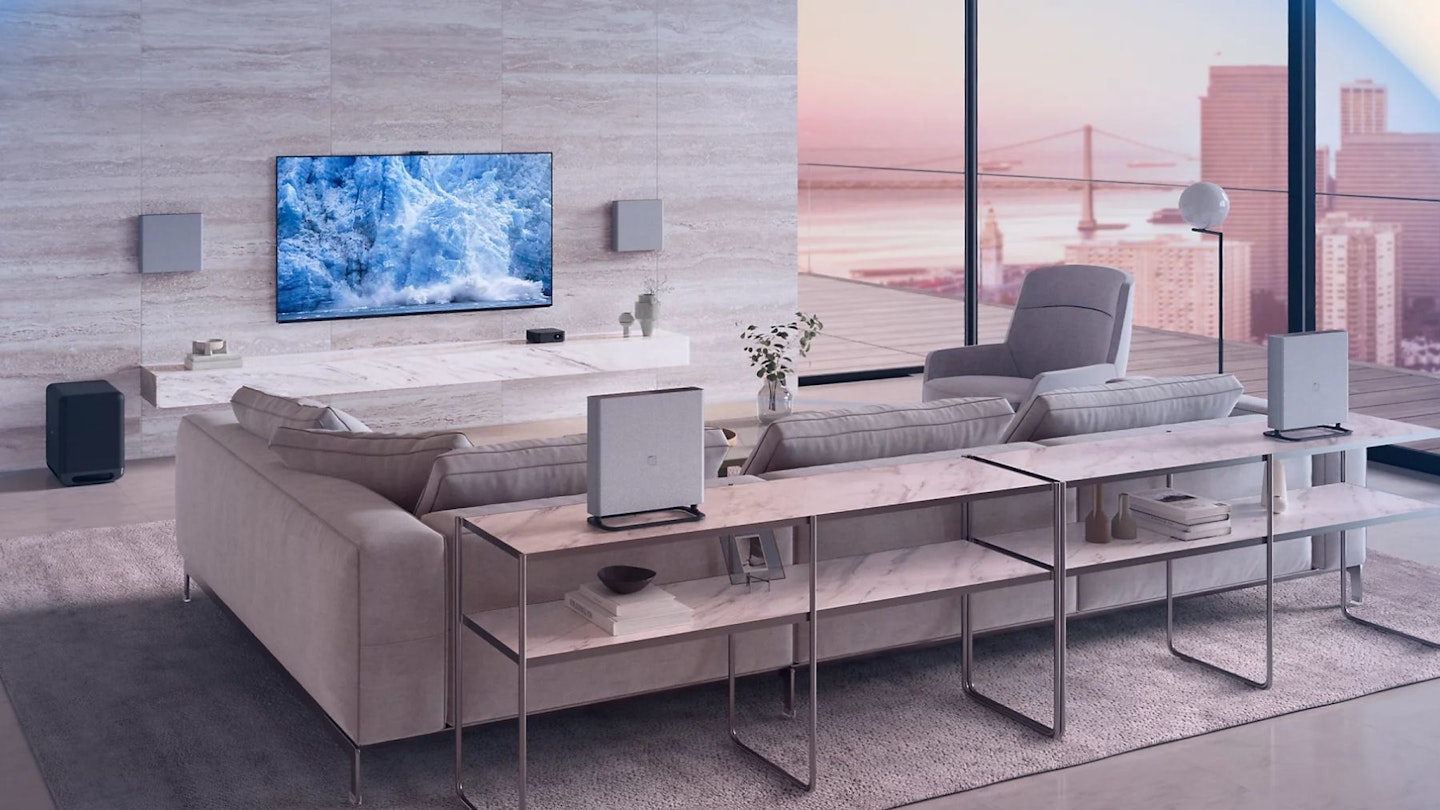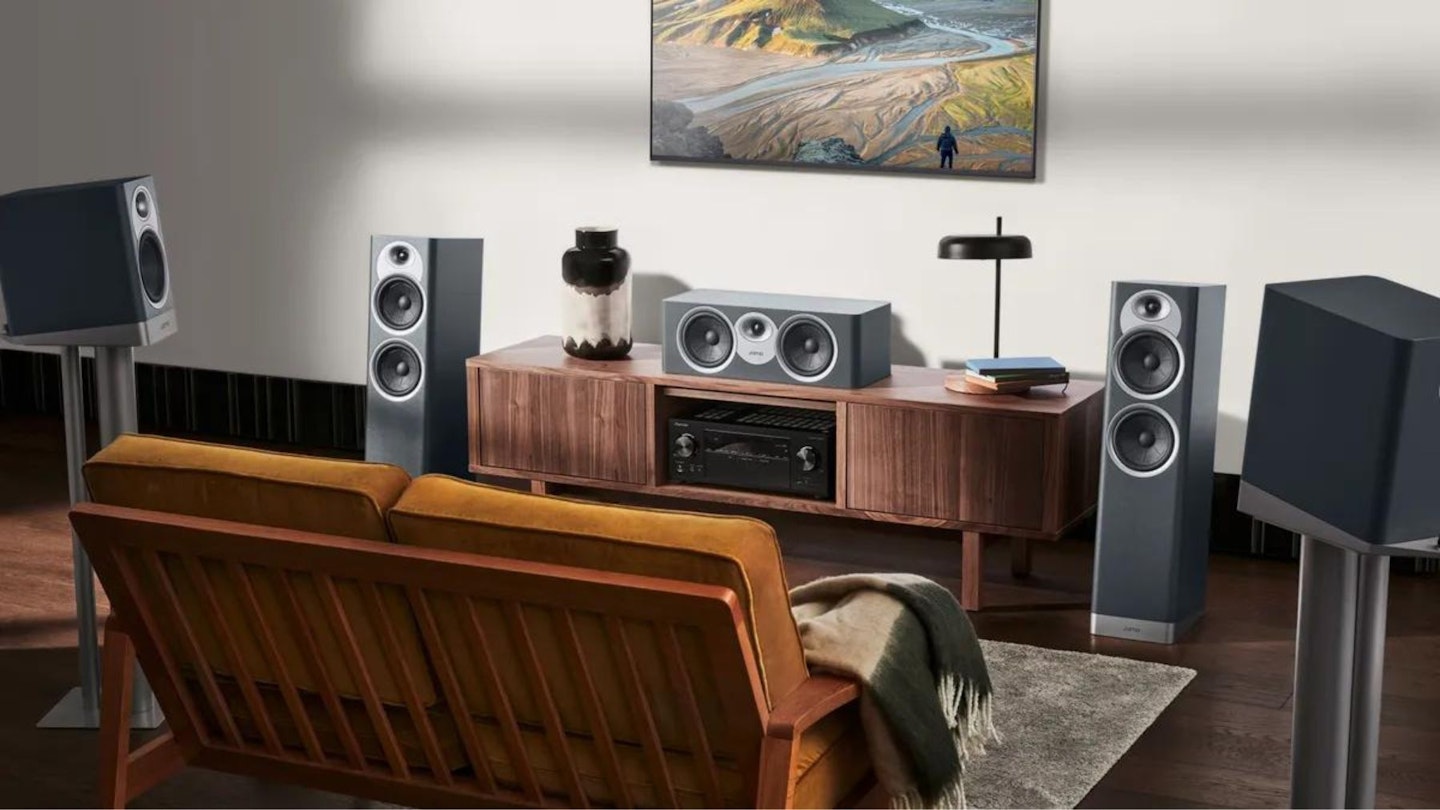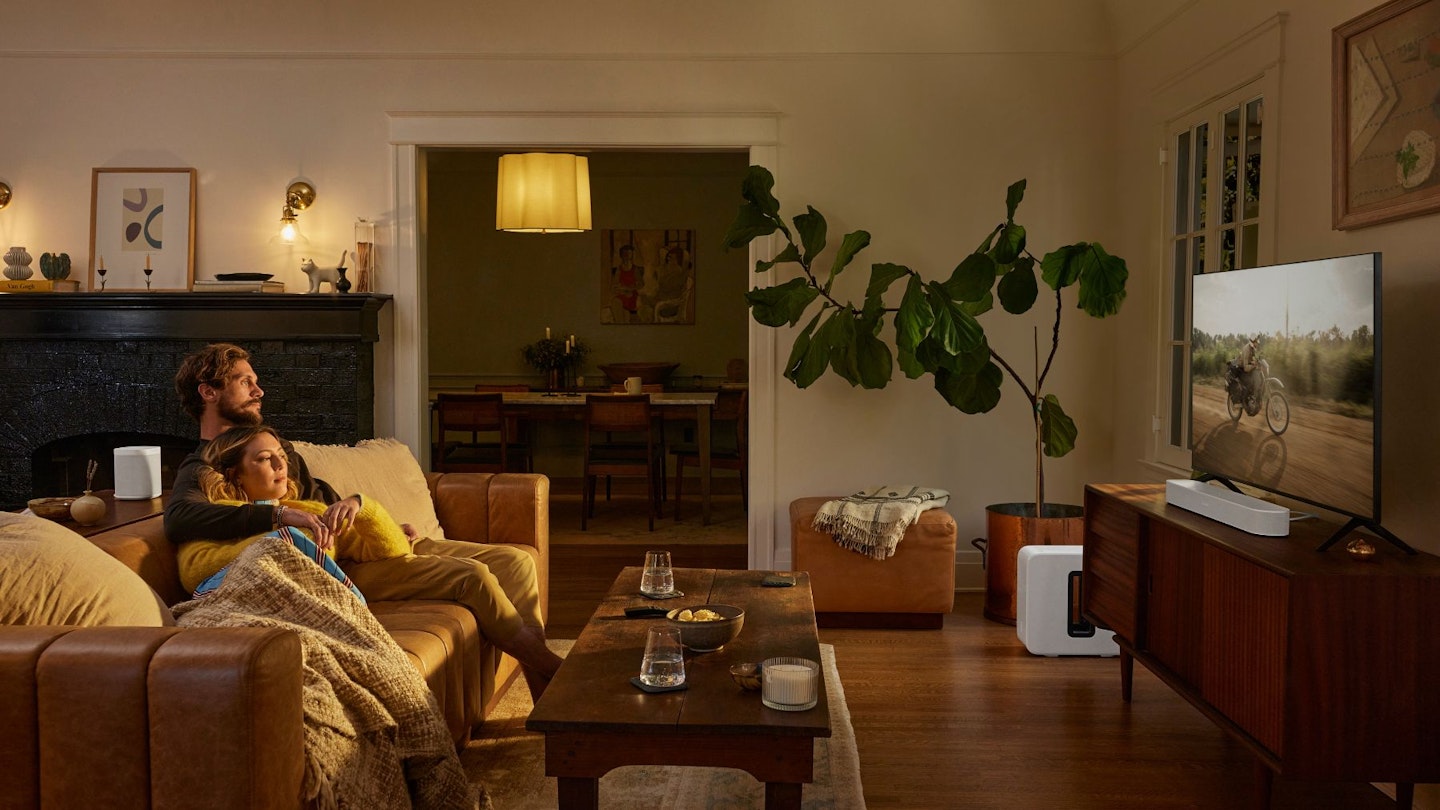Maybe you’ve decided to treat yourself to one of the best smart TVs on the market, and you’re enjoying that beautiful 4K display, the vibrant HDR, and the ultra-thin screen. And while all that is great, you may find that the built-in audio is...fine. And fine is...okay. But when you’ve spent all that money and have a beautiful new television to enjoy, should you settle for fine? Razor-thin screens mean less room to fit great speakers, which can reduce quality - particularly bass and treble. Happily, it’s relatively easy to transform your audio from fine to fantastic using a soundbar or speakers.
Soundbars and speakers are designed to provide a richer audio experience than you are likely to get from the built-in speakers on your TV (unless you've gone out of your way to get a TV with the best sound). However, there are some differences between using a soundbar and using a speaker set-up in terms of cost, design, and sound quality. So, which one is right for you?
Soundbars

A soundbar is a slim, rectangular bar with several speakers next to each other. It is typically placed just below the TV, whether on your TV stand or wall-mounted. Ideally, a soundbar should sit directly in front of you at ear level to provide the best experience.
Soundbars connect to your TV and use their higher-quality speakers to project the audio into your room. A good-quality sound bar will deliver noticeable improvements to sound quality, with clearer dialogue and better separation between left and right sounds. Some soundbars come with built-in woofers (which produce lower frequencies), while others come with a separate subwoofer. Some also come with rear speakers to go behind you, creating a more complete surround sound experience.
New innovations in soundbars also allow them to imitate some of the features of a true surround sound system. Dolby Atmos, for example, uses upwards-facing speakers to bounce sound off the ceiling before reaching you. This creates the effect of surround sound by making it seem like the sound is coming from somewhere other than directly in front of you.
Soundbar pros:
Cost – While soundbars can get very pricey, they are generally less expensive than the cost of a full set of speakers will be. Some of the best soundbars are very budget-friendly.
Simplicity – Soundbars include everything you need right out of the box. They often only have one or two cables, so they’re easy to plug in, and won’t have wires all over the room, which can look unsightly or become a trip hazard, depending on your room layout. Many soundbars are wireless and use Bluetooth to connect to your television.
Having a Bluetooth connection also means you can use a soundbar to stream music from your phone or tablet – perfect for parties.
Size – A soundbar is a single unit which is small enough to fit under your television. They won’t take up any other space in your room, which is ideal for people who don’t have anywhere to put several speakers. It also means you can rearrange your furniture without having to rearrange your audio set up.
Sound quality – compared to the speakers on your television, chances are almost any decent soundbar is a significant improvement in sound quality. As we mentioned earlier, the incredibly thin design of a modern television means there simply isn’t space to fit high-quality speakers and amplifiers. A soundbar has more room for these components, so can offer a superior experience as a result.

Soundbar cons
Sound quality compared to speakers – A soundbar will provide a substantial audio upgrade compared to your television. But ultimately, a good quality speaker set up is going to provide better sound quality than a soundbar. Speakers have more room for the components, which can result in better bass, treble, and mid-range performance. The difference can be particularly pronounced in larger rooms.
Size limitations – yes, the smaller size of a soundbar can be beneficial, especially to those with smaller rooms. But at the same time, a soundbar can only get so big before it starts blocking the TV screen. As a result, if you’re someone who really wants to maximise the bass sounds, a soundbar will struggle to provide a subwoofer that’s as big as you can find on a separate speaker.
Some soundbars can be connected to a separate subwoofer or speaker system. But then you’re looking at more costs, and a slightly more complicated setup process.
Speakers

The best speakers come in an incredibly wide range of shapes and sizes. There are bookshelf speakers, fully-fledged surround sound systems – which often have five to seven separate speakers – and traditional stereo speakers, which might sit on either side of your TV, for example.
Then there are passive speakers, which require an external amplifier to route sound to them, and active speakers, which have their own power and amplifier functions.
There is far more variety in speakers than you’ll find in soundbars. While that does make it slightly more complex, it also means that there is a lot more scope for customisation to create exactly the right set-up for you.
Speaker pros
Sound quality – while a soundbar is a significant upgrade over what’s in your TV set, they still have limitations in terms of their size, which means that a decent quality set of speakers provide an even higher quality audio experience. Whether that’s a pair of great stereo speakers, or you’re looking to create the best surround sound system, speakers offer the absolute pinnacle of sound quality.
Flexibility – A speaker system can be built entirely to suit your needs. You can. For example, start with just a couple, before building it out into a more complete surround-sound system. This can be particularly beneficial if you don’t want to make a big investment all at once.
You've also got the choice to swap individual speakers out. Maybe one has worn out, broken, or you just want to upgrade it with a higher quality unit. You can even mix and match with different brands, should you wish.
Finally, you can position each speaker exactly where you want it, whether that’s completely repositioning them, or making subtle adjustments to create a perfect audio bubble.

Speaker cons
Less convenient – speakers will almost inevitably take up more space than a soundbar. And depending on how your room is set up, it may be difficult to find suitable places to put them without compromising their effectiveness.
There’s also the fact that if you’re planning to buy multiple speakers, that’s going to involve more research, to make sure you’re getting the right speakers for your room.
Harder to set up - if a soundbar is incredibly simple to set up and use, speakers will need a bit more work. You’ll need to work out where to position them, potentially having to move furniture around to accommodate them. You may also have lots of different cables that you’ll need to connect, while also making sure they don’t get in the way.
Cost – finally, speakers will generally end up being a more expensive way to enhance your TV audio. For example, you might want to buy a pair of the best bookshelf speakers. But then you may also need to buy an AV receiver to allow you to connect the speakers to the television. And that’s adding more hassle, plus more expense.
Of course, speakers don’t have to cost the earth, and there are some very expensive soundbars available. But, in general, a multi-speaker set up will likely end up costing more.
So, should I get a soundbar or speakers?
There’s plenty to think about when it comes to choosing between soundbars and speakers. But we’d summarise it as follows:
If you’re buying it for a smaller space, don’t want to spend a lot, or you want the easiest possible set up, then a soundbar may be your best bet. We’ve got some advice on how to choose a TV soundbar if you need some help.
Or, if you want to build out the perfect audio system for a dedicated home cinema, your TV is in a large room, or you’re an audiophile, then speakers will give you more options to create the best set up.
Whichever option you choose, you’re almost certainly going to enjoy a much richer soundscape than you’ve been used to through your TV.
Steven Shaw is a Senior Digital Writer covering tech and fitness. Steven writes how-to guides, explainers, reviews and best-of listicles covering a wide range of topics. He has several years of experience writing about fitness tech, mobile phones, and gaming.
When Steven isn’t writing, he’s probably testing a new smartwatch or fitness tracker, putting it through its paces with a variety of strength training, HIIT, or yoga. He also loves putting on a podcast and going for a long walk.
Subscribe to the What’s The Best Newsletter to keep up to date with more of the latest reviews and recommendations from the What’s The Best team.
